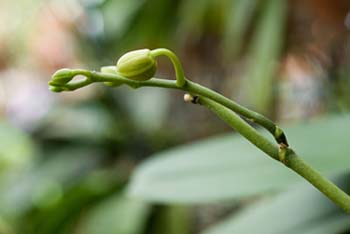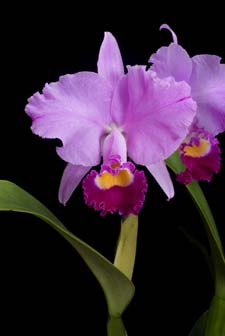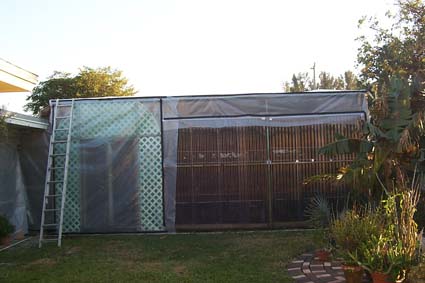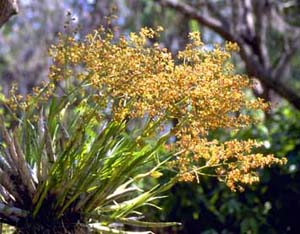|
Welcome to the AOS Beginner's Newsletter. We will be sending you monthly tips on how to grow orchids and help you get them to bloom again. In addition to the information presented here, we invite you to visit the AOS website at www.aos.org and check out the information found under ORCHID INFORMATION > ORCHID BASICS.
Baby It's Cold Outside

Except for a few parts of the country, winter is in full swing. This week the midwest and eastern states received the first big storm of the season. The shorter and often dull days, along with cooler temperatures, affect our orchids in both good and bad ways. This newsletter will cover orchid care for the winter season.
First the good news; cooler temperatures and/or shorter days send the signal to many orchid genera and species that it is time to flower. Inflorescences on many
Phalaenopsis (left) and Cymbidium hybrids should be well developed by Christmas. Be on the lookout for bugs that think of your precious orchid buds as tasty winter treats. Mealybugs will be the most likely suspects. Fortunately, these soft-bodied pests can be easily controlled with one teaspoon castile soap (we use Dr. Bronner's Peppermint Soap) in a quart of water in a hand sprayer. This safe home treatment may require several applications every other day until control is achieved. Don't be tempted to mix any chemical control, even one as benign as soap, stronger than recommended.

It is a good idea to begin staking Phalaenopsis spikes before they get too far along. We will have a photo essay in the April issue of ORCHIDS magazine showing how to prepare orchids for display, but for now there is a brief explanation of how to
stake a Phalaenopsis here. Certain
Cattleya species bloom on cue for the holidays, notably Cattleya trianae and
C. percivaliana (although both bloom across wider seasons in nature). It is a good idea to stake cattleyas also, as the flowers will display better. Decorating the home with blooming orchids can provide colorful accents that are always admired by guests. If you have any orchid shows nearby at this time of year, try to make the time to attend one and pick out a few plants that will bloom reliably at the holidays for years to come.
shown at
right: Cattleya trianae 'Mary Fennel' HCC/AOS
Here are a few suggestions to keep your orchids healthy this winter;
-
If you are a windowsill grower, the light will be entirely
different at this time of year. Assess it carefully and make any necessary adjustments. A south window may be brighter due to bare trees and the sun being lower in the sky. Watch for sunburn and move plants back from the window or add a sheer curtain to cut down the light.
-
Shorter days and gloomy weather in many parts of the country can cause plants to produce soft growths that are more susceptible to pests and disease. Some orchids will not flower if they do not receive enough light. If necessary, use a growlight on a timer to provide additional light in winter.
-
Orchids grow more slowly in winter and will need less water and fertilizer. Most growers cut their fertilizer back to twice a month at half strength. Monitor orchids to keep them at their proper moisture level for their type. Generally, orchids will need about half as much water in winter as they do in summer. Some orchids must have a dry winter rest in order to flower.
-
The loss of humidity as a result of forced air heating can take its toll on your orchids. Remember, most orchids grow optimally with 60-75% humidity. If your home is especially dry, and you will know by the way your own skin reacts to winter, provide extra humidity for your orchids. A tried and true method is to set orchid pots on trays of pebbles that are filled with water; just make sure your plant is not setting in the water. Misting a couple times a day can also help.
-
Winter is cold, so protect plants from drafts. If buds start falling off of a
Phalaenopsis infloresence the first thing to suspect is a drafty window. Do not put plants close enough to a window to touch the glass!

If you happen to be lucky enough to live in an area where you
grow your orchids outdoors year-round, don't be caught with your guard down.
Even South Florida, the Gulf Coast and Southern California can experience
damaging cold temperatures. Have a plan and supplies for covering or moving
plants should cold weather be heading your way.
Providing a little extra attention to your orchids at this time of year will get them through the winter in good health and bloom!!!
Greg Allikas
December 2009

Did You Know?
Cyrtopodium punctatum holds the record for most orchid seeds in a pod, about 7½ million seeds per pod. Barbosella australia on the other hand, hold the record for least, at about 25,000 seeds per pod.
(Koopowitz, H., Orchids and Their Conservation, Timber Press, Portland, 2001, p.10)
|

